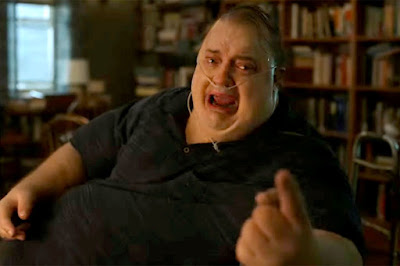Film review: The Whale (2022)
SPOILERS AHEAD
After watching 'The Whale' less than twenty-four hours after Brendan Fraser's Oscar win for Best Actor, the opportunity to view the film with fresh eyes had mostly passed. Having read discussions and outrage highlighting a perceived lack of humanity and dignity towards individuals and communities who are overweight (some have reclaimed and prefer 'fat', 'plus-sized' etc), in tandem with its critical acclaim (garnering a six-minute standing ovation at last year's London Film Festival), I was interested to see where I might place my critical stake. There is much to consider, but I would stand by my conviction that the film's director, Darren Aronofsky, will not be winning accolades from the fat liberation movement anytime soon. As incredible a performance as Fraser gives, it is rather sticky to have a heterosexual, comparatively slender actor essentially play dress-up as an obese man. Lest we forget, the character is overweight, drastically so, but he is no monster. This is not an unfathomable, phantasmagorical creature; Charlie's bodily form exists in many real people around the world. Yet, if the tale itself wasn't so dark and poignant, the film could be accused of portraying fatness in a cartoonish manner. It remains to be seen as to whether future generations will indeed view it through that lens.
With a plot centred on a morbidly obese gay man whose trauma of losing his partner leads him spiralling towards a stagnant lifestyle that proves lethal, there are a cocktail of emotions swirling from its opening scene. To claim that the film's spotlight on Charlie is devoid of humanity would be hastily incorrect, especially observing the character's relationships with those closest to him, namely his friend and live-out nurse-carer, Liz; his ex-wife, Mary; his beloved but estranged daughter, Ellie, even Dan the Pizza Man. That which edges the film towards the 'difficult to watch' category is less the daily struggle Charlie faces with his health and immobility, but the invariably fractured, fragmented relationships he has with the women in his life. Having left his young family almost a decade prior, in pursuit of a relationship with a male student, the fall-out of his actions reverberated into despair and pure, incensed hatred felt by Ellie towards her father. With no health insurance, which we later discover is a money-saving, avoidable tragedy, we watch Charlie and those around him respond helplessly and fatalistically as his health rapidly deteriorates. This is despite the care provided by Liz, whose late brother Alan was the student-turned-lover of Charlie, the suicide of whom was the catalyst for his rapid weight gain.
It is no surprise that 'The Whale' was originally a play, as other than a bus pulling into Charlie's town and a heartbreakingly tender flashback from Charlie and Ellie's past, the film is set entirely within Charlie's apartment. Set designers have proffered a little dignity by making the protagonist's home only moderately disgusting, but not entirely abhorrent. The dark, moody lighting of the main living space also sets up a smooth contrast with the spare room in the apartment, formerly belonging to Charlie and Alan, which is pristine, tranquil, and seemingly untouched since the latter's death.
Many critical themes arise in the film, some which are furthered by the plot and its characters, with others falling by the wayside. One of the former is loneliness and isolation experienced by people with mobility issues; the film being based entirely in the apartment, including Charlie's job of writing tutelage to college students online, is decidedly, and effectively, claustrophobic. This is true in the physical and visual realms concurrently, as his entire learning domain on Zoom is small, contained, immaterial. The character's decision to keep his camera off, to prevent his students from seeing his real self, is another move that feels very awkward for the viewer; the repetitive disempowering of a morbidly obese person feels, for lack of a better phrase, bigger than Charlie.
There are also, arguably, some less interesting threads, such as the binary between Charlie's obesity and Alan's supposed hunger strike prior to his suicide, and the entire character arc of Thomas, played by Ty Simpkins, a religious door-to-door preacher who visits Charlie in his home. He brings with him a sub-plot which adds little and is at times distracting. Finally, the link between the film's title, the Moby Dick connection, and the underlying recognition that the mammal can be used as a slur towards bigger people, doesn't really feel smart enough to be as prevalent as it is throughout the plot; this aspect of the film certainly leaves the viewer wanting more.
The emotional and scholarly intelligence Charlie shows during his teaching does not quite reflect in the in-person interactions we see. This friction ultimately makes the character appear more human and real, but his blind devotion to his daughter and hot-and-cold, often dismissive relationship with the wonderful Liz, played by Hong Chau, makes 'The Whale' a film that is, at times, truly painful to watch. One feels that this is very much the desired effect towards how we view Charlie in his supposedly grotesque state, but the lack of hope held by all characters is not only difficult to swallow, but is something we are increasingly encountering in life outside the screen, both socially and politically.
Despite the varied reviews, some claiming 'The Whale' to be an emotional masterpiece while others finding it appallingly insulting, it cannot be denied that many viewers will have their emotions deeply manipulated. Considering this, an intimate theatre may be the story's perfect setting. Having the characters move in and out of Charlie's central space would make an excellent play, especially the thrashing of the insufferable Ellie, whose attitude to her father is so maddeningly hurtful that the viewer must interrogate whether Charlie's crime of abandoning the family home is deserving of her relentless verbal abuse (some will argue that "yes, yes it is"). The audience sharing a physical space with the characters would make the emotions even more potent, with gasps echoing as we breathe in the same air as those on stage. However one advantage of the big screen is the film's crescendo finish; the special effects of a blinding white light casting across the sky as the physical and mental pain in Charlie's life drains his body as he dies is unforgettable, and I witnessed a full cinema descend into total silence, save for some tears.
Ultimately, it is the residual themes around excessive weight gain, and the resulting lifestyle, that makes the film memorable and heart-wrenching. That Charlie gained significant weight after a trauma is the real way in which he relates to the audience, not a form of pity from the fatness itself. We can consider the social model of disability, whereby it is one's immediate and wider environments that disable a person, rather than the disabling coming from the illness itself; however in Charlie's case, his habitual patterns of mere survival usurping any desire to thrive overwhelm him. What we witness before us is another, albeit fictional, case study of the mental health crisis we are facing. Trapped in Charlie's apartment, we are left inescapably counting down the minutes, hours, and days. In a world that ostracises and isolates disability and immobility, this was never about pity, but a stark dramatised look at a reality faced by millions of people around the world, most of whom remain invisible.
I would like to recommend Beth Younger, Drake University's Associate Professor of English & Women and Gender Studies' take on the film, as her take that 'The Whale' "taps into our fear of fatness" is astute and reasoned.



